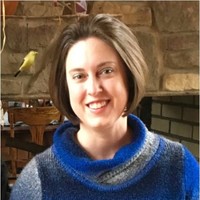
Gail M. Drus
- Courses2
- Reviews6
- School: Saint Francis University
- Campus:
- Department: Biology
- Email address: Join to see
- Phone: Join to see
-
Location:
117 Evergreen Drive
Loretto, PA - 15940 - Dates at Saint Francis University: April 2015 - January 2019
- Office Hours: Join to see
Biography
Saint Francis University - Biology
Resume
2018
Loretto
PA
I am an Associate Professor of Biology and Environmental Studies at Saint Francis University in Loretto
PA with 16 years of university-level teaching experience in general biology
ecology
zoology
and botany. As a teacher
I aim to extend past the boundaries of the traditional classroom by engaging students in fieldwork
supervising undergraduate research projects and involving students in study abroad programs in areas rich with biodiversity. I have traveled with my student in Field Biology courses to Florida to swim with Manatees
to Portal Arizona
to Costa Rica
and most recently to the Galapagos islands. My research focuses on effects of species invasions on plant community structure and function. I specialize in invasive plant biology
plant community and population ecology
fire ecology
and desert riparian ecology. I have studied Tamarix invasion and fire issues since 2006 and have published in the International Journal of Wildfire
the Journal of Biological Control
was a contributing author to the book “Tamarix: a case study of ecological change in the American West
” have coauthored several government reports related to Tamarix invasion
and have several publications in prep. I have also shared my research through numerous invited presentations
posters
and professional meetings. The outcome of my research has contributed to general ecological knowledge concerning the impacts and management of invasive plant species. I have continued studying Tamarix and other invasive riparian plants at Saint Francis University. I am currently building a research program focused on invasive Japanese knotweed (Fallopia japonica) and other invasive plants of significant economic and ecological concern in Pennsylvania and the greater Mid-Atlantic region. I earned my Ph.D. in Ecology at University of California
Santa Barbara
and my M.S. and B.S. in Biology at California State Polytechnic University
Pomona.
Associate Professor of Biology and Environmental Studies
Saint Francis University
2006
Doctor of Philosophy (Ph.D.)
Fire Ecology of Invasive Plants
University of California
Santa Barbara
Gail Drus - Saint Francis University
Teaching
Environmental Awareness
Ecology
Data Analysis
Research
Botany
Science
Climate Change
Statistics
Biology
Scientific Writing
Drus Ph.D.
Drus Ph.D.
Department of Ecology
Evolution and Marine Biology
UC Santa Barbara
Saint Francis University
Dr. Drus is an Assistant Professor of Biology and Environmental Studies at Saint Francis University in Loretto
PA. Her research focuses on effects of species invasions on plant community structure and function. She specializes in invasive plant biology
plant community and population ecology
fire ecology
and desert riparian ecology. She has studied Tamarix invasion and fire issues since 2006 and has published in the International Journal of Wildfire
the Journal of Biological Control
was a contributing author to the book “Tamarix: a case study of ecological change in the American West
” has coauthored several government reports related to Tamarix invasion
and has several publications in prep. She has also shared her research through numerous invited presentations
posters
and professional meetings such as the Ecological Society of America
Tamarisk and Russian Olive Research Conferences
and Weeds Management Associations. The outcomes of her research have contributed to general ecological knowledge concerning the impacts and management of invasive plant species. She continues studying Tamarix and other invasive riparian plants at Saint Francis University. Dr. Drus has 13 years of university-level teaching experience in general biology
ecology
zoology
and botany and often teaches science courses targeted to non-science majors. As a teacher
she aims to extend past the boundaries of the traditional classroom by engaging students in fieldwork
supervising undergraduate research projects and involving students in study abroad programs in areas rich with biodiversity. Dr. Drus earned her Ph.D. in Ecology at University of California
Santa Barbara
and her M.S. and B.S. in Biology at California State Polytechnic University
Pomona.
Saint Francis University
Department of Ecology
Evolution and Marine Biology
UC Santa Barbara
University of California
Santa Barbara
My research revolves around the fundamental question: What factors drive and regulate the composition of ecological communities in space and time? I use perturbations
such as fire disturbance and non-native plant invasion
as tools to derive a better understanding of the biotic and abiotic factors limiting community composition. I conduct research that not only enhances our collective understanding of ecological processes
but also provides tools that land managers can apply to various environmental issues. To address this broad research theme
I have investigated the effects of human disturbance
plant invasion
and multiple stresses on fire disturbance and plant survival. In the field of fire ecology and management
important and exciting general questions remain concerning the consequences of altered fire regimes on the landscape and biota as biotic and abiotic components change due to continued human disturbance
plant invasions
climate change
and other factors such as insect and pathogen outbreaks. Management strategies must adapt to these continually changing environmental conditions by using a growing body of ecological theory to serve as the intellectual grounding for creating sound management practices. I am eager to contribute to the building of this obligate partnership as I view ecological science as a powerful guiding tool in our policy decisions involving fire and the management of forests and wildlands. I hope to contribute meaningfully to plant ecology through endeavors in the theory and practice of fire ecology and physiological plant ecology as a means to determine the mechanisms underlying shifts in community composition due to the ability of individual species to recover following fire
and due to the invasion of fire-promoted plants. As global change
fires and landscapes interact
these issues will become ever more complex.
Doctoral Candidate
